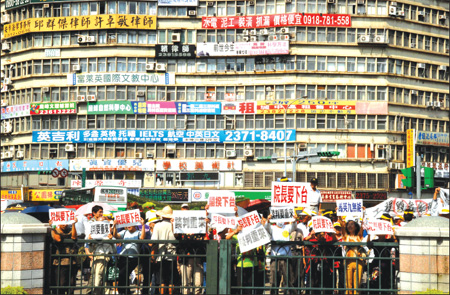Ma vows to protect public health and global interests
Updated: 2009-10-30 07:46
(HK Edition)
|
|||||||
|
Hundreds of people gather in front of Taiwan's top prosecutor's office in Taipei yesterday to voice their opposition to the resumption of imports from the US of certain beef products they believe will put their health at risk. CNA |
TAIPEI: Taiwan leader Ma Ying-jeou vowed yesterday to find a balance between Taiwan residents' health and Taiwan's global creditability after the government decided last week to open its door wider to US beef products, a move that has elicited concern and consternation in some quarters in Taiwan. Ma commented on the issue when receiving a group of Taiwanese business people and Taiwan-based foreign trade officials recognized as outstanding this year.
Commenting on the controversy arising from the US beef issue, Ma said the government fully respects the initiatives launched by the private sector to boycott some of the US beef products that will soon be allowed into Taiwan in line with a protocol inked by Taiwan and the United States on October 22 in Washington, DC to lift a partial ban on US beef imports.
"If the private sector can take the initiative to screen the stuff they want, it will help spare the government from re-opening the talks with the United States and help avoid hurting Taiwan's global creditability," Ma said.
Still, Ma tried to reassure the public about the safety of the beef products from the United States.
According to the president, the US side will control its beef product quality from the origin, while Taiwan's veterinarians are entitled to conduct checkups at designated slaughterhouses in the United States.
The United States will be responsible for effective management of its beef in the very beginning, while the Taiwan authroities will be accountable for the same issue on the island, Ma explained.
"This sort of quality control mechanism is the strictest management ever seen."
Ma said Taiwan could not turn down the United States' demand to hold negotiations on the issue, in conformity with the norms of the World Trade Organization (WTO); but throughout the whole negotiation process, government officials did adhere to the principle of security and safety.
The terms obtained at the negotiating table should be enough to help protect Taiwan residents' health, he said. "This is the reason behind the government's decision to relax restrictions on the importation of US beef," he added.
Under the new pact, US bone-in beef, ground beef, offal, brains, and processed beef from cattle younger than 30 months that have not been contaminated with "specific risk materials" will be permitted to enter Taiwan, starting November 10.
Specific risk materials are defined in the protocol as brains, skulls, eyes, trigeminal ganglia, spinal cords, vertebral columns and dorsal root ganglia from cattle 30 months of age and older, or tonsils and the distal ileum of the small intestine from cattle of all ages.
Also yesterday, Wu Den-yih, head of the Executive Yuan, said US beef offal and ground beef will not appear in Taiwan's markets, despite the government's decision last week to open its door wider to US beef products.
According to Executive Yuan spokesperson Su Jun-pin, Wu asked DOH Bureau of Food Safety at a meeting yesterday to assist US beef importers to form an association as a second-tier regulator to enhance supervision and control of the beef imports.
However, Wu said the government has no plans to resume talks with the United States on beef imports for now, Su added.
Meanwhile, Taiwan's top health official, Yaung Chih-liang, said the government will immediately stop US beef imports if even just one case of bovine spongiform encephalopathy (BSE), or mad cow disease, is found in Taiwan.
Yaung made the remarks while responding to a question by a ruling Kuomintang (KMT) legislator at a legislative committee meeting.
Economic affairs chief Shih Yen-shiang also explained yesterday at the legislative meeting that during talks with the US on beef imports there were no other terms or conditions attached to the deal.
China Daily/CNA
(HK Edition 10/30/2009 page2)
